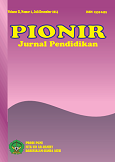PENGEMBANGAN INSTRUMEN PENILAIAN KOGNITIF DALAM PEMBELAJARAN TEMATIK TERPADU KELAS 4 SD
DOI:
https://doi.org/10.22373/pjp.v9i2.9280Keywords:
Development, Cognitive Assessment Instruments, Thematic IntegratedAbstract
The purpose of this study is (1) to know how to develop cognitive assessment instruments in the thematic learning of grade 4 elementary school (2) knowingthe valid levelof cognitive assessment instrument development in grade 4 primary school thematic learning based on classical analysis of problem items. (3) know the practicality of the development of cognitive assessment instruments in the thematic learning of grade 4 elementary school based on classical analysis of problem items. This RnD research goes through a preliminary study phase, product development and product trials. The subjects of this study were grade 4 teachers and students of SD Negeri 03 Ampel Boyolali. The results of this study provide the results that (1) how to develop cognitive assessment instruments is to determine a theme, KI, KD, GPA, learning objectives, measuring instruments, grids, question points, validation tests, practicality tests, and determine a final product (2) Item instruments in the form of PG 20 and description consists of 5 questions. Based on validtests conducted by experts, which include integrated thematic material experts got a score of 78 % with the criteria "high". From linguists get a score of 90.9 % with a "very high" criteria. And from the assessment experts get a score of 78.5 % with the criteria "high". 3) The development of cognitive assessment instruments in integrated thematic learning of 4SD classes through practicality tests obtained 84% teacher response results with "high" criteria. From the response of the questionnaire students with a total of 11 children scored 89.2 % with the criteria "high". Of all the percentage results of the development of cognitive assessment instruments in integrated thematic learning deserves to be used as an evaluation of grade 4 learning on the theme of 6 ideals sub-theme 1 me and my ideals.
References
Abdullah Sani, Ridwan. Penilaian Autentik, (Jakarta: PT. Bumi Aksara. 2016)
Arifin, Z. Evaluasi Pembelajaran, (Bandung: PT. Remaja Rosda Karya. 2009)
Arifin, Z., & Retnawati, H. Pengembangan instrumen pengukur higher order thinking skills matematika siswa SMA kelas X. PYTHAGORAS: Jurnal Pendidikan Matematika, 12(1), 2017)
Awaliyah, S. Keterampilan Abad Ke-21: Keterampilan Yang Diajarkan Melalui Pembelajaran. Jurnal Praksis Dan Dedikasi Sosial, 1(1), (2018)
Hartini, H., & Sukardjo, S. Pengembangan higher order thinking multiple choice test untuk mengukur keterampilan berpikir kritis ipa kelas VII SMP/MTs. Jurnal Inovasi Pendidikan IPA, 1(1), (2015)
Helmawati, Pembelajaran dan Penilaian Berbasis HOTS. (Bandung: PT Remaja Rosdakarya. 2019)
Mardhiyana, D., & Jailani, J. Pengembangan model asesmen pembelajaran matematika SMA berdasarkan kurikulum 2013. Pythagoras: Jurnal Pendidikan Matematika, 12 (2), (2017)
Permendikbud Nomor 104 Tahun 2014 tentang Penilaian Hasil Belajar Oleh Pendidik Pada Pendidikan Dasar dan Pendidikan Menengah.
Permendikbud. Nomor 23 Tahun 2016 Tentang Standar Penilaian Pendididkan
Prabowo, Pembelajaran Tematik Terpadu. (Malang: Gaya Media, 2000)
Pratiwiningtyas, B. N., Susilaningsih, E., & Sudana, I. M. Pengembangan Instrumen Penilaian Kognitif untuk Mengukur Literasi Membaca Bahasa Indonesia Berbasis Model Pirls pada Siswa Kelas IV SD, (Journal of Research and Educational Research Evaluation, 2017)
Purnanto, A. W., & Mustadi, A. Analisis Kelayakan Bahasa Dalam Buku Teks Tema 1 Kelas I Sekolah Dasar Kurikulum 2013. Profesi Pendidikan Dasar, 3 (2), 2016)
Setiawan, Eko. Pembelajaran Tematik Teoris dan Praktis, (Jakarta: Esensi Erlangga Group, 2018)
Sukmadinata, Nana Syaodih. Metode Penelitian Pendidikan, (Bandung: Remaja Rosdakarya. 2012)
Teti, T., Kosasih, E., & Hamdu, G. Pengembangan Lembar Kerja Peserta Didik Berbasis Hots Berdasarkan Taksonomi Bloom di Sekolah Dasar. Pedadidaktika: Jurnal Ilmiah Pendidikan Guru Sekolah Dasar
Ulya, H Profil Kemampuan Pemecahan Masalah Siswa Bermotivasi Belajar Tinggi Berdasarkan Ideal Problem Solving, Jurnal Konseling Gusjigang, 2016)
Usmaedi, U. Menggagas Pembelajaran HOTS Pada Anak Usia Sekolah Dasar. JPsd (Jurnal Pendidikan Sekolah Dasar, 2017)
Wardani, Naniek Sulistya, dkk. Asesmen Pembelajaran SD (Semarang: Widya Sari Press, 2012)
Widana, I Wayan. Modul Penyusunan Higher Order Thingking Skill (HOTS). Direktorat Pembinaan Sma Direktorat Jenderal Pendidikan Dasar Dan Menengah Departemen Pendidikan Dan Kebudayaan, 2017
Widyaningrum, R. Model pembelajaran tematik di MI/SD, (Cendekia: Jurnal Kependidikan Dan Kemasyarakatan, 2012)
Downloads
Published
Issue
Section
License
- Authors retain copyright and grant the journal right of first publication with the work simultaneously licensed under a Creative Commons Attribution License that allows others to share the work with an acknowledgment of the work's authorship and initial publication in this journal.
- Authors are able to enter into separate, additional contractual arrangements for the non-exclusive distribution of the journal's published version of the work (e.g., post it to an institutional repository or publish it in a book), with an acknowledgment of its initial publication in this journal.
- Authors are permitted and encouraged to post their work online (e.g., in institutional repositories or on their website) prior to and during the submission process, as it can lead to productive exchanges, as well as earlier and greater citation of published work (See The Effect of Open Access).

